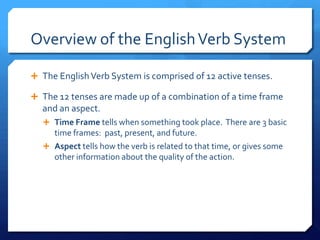
Module 2.1.2 Overview of Verb Tenses
- 1. Overview of the English Verb System The English Verb System is comprised of 12 active tenses. The 12 tenses are made up of a combination of a time frame and an aspect. Time Frame tells when something took place. There are 3 basic time frames: past, present, and future. Aspect tells how the verb is related to that time, or gives some other information about the quality of the action.
- 3. Verb Forms There are some simple rules to remember when forming verbs. Progressive tenses use: BE+ Verb – ing present progressive = > is/are studying past progressive = > was/were studying future progressive = > will be studying Perfect tenses use: HAVE + Past Participle present perfect = > have/has studied past perfect = > had studied future perfect = > will have studied
- 4. So… Perfect Progressive tenses use HAVE + BEEN + Verb – ing present perfect progressive = > have been studying past perfect progressive = > had been studying future perfect progressive = > will have been studying BE and HAVE should always agree with the subject of the sentence and match the time frame. Now let’s practice… click below for the next activity.
- 5. Go to your next activity….